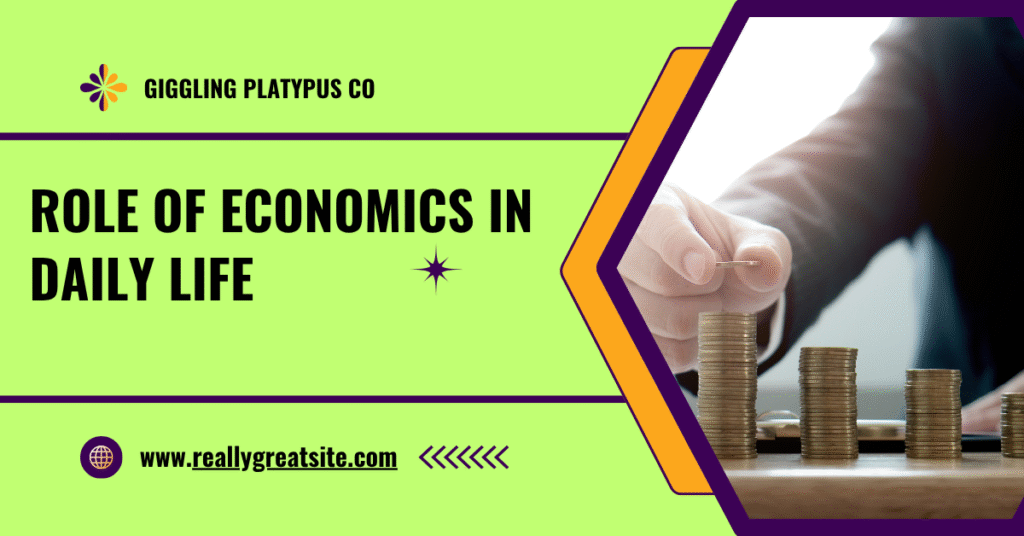Every person makes economic decisions regularly, often without realizing it. When you compare prices at the supermarket, decide to save money instead of spending it, or choose between buying a new phone or paying rent—you’re practicing basic economics.
Smart Financial Decisions
Economic choices are made by everyone on a daily basis, sometimes without their knowledge. Basic economics is used when you evaluate costs at the grocery store, choose to save money rather than spend it, or decide between paying your rent and purchasing a new phone.
Important ways that economics informs personal finance
- Creating a monthly spending plan
- Choosing to invest or save
- Recognizing opportunity cost
- Making value-based, well-informed purchases
- Purchasing power, inflation, and prices
All people are impacted by inflation. Your budget is immediately affected if the cost of bread or gasoline rises. Understanding inflation makes it easier for people to budget for future costs.
Why this is important
- Keeps buying power stable.
- Impacts wage discussions and expectations
- Helps make investing choices
- Impacts the savings objectives of households
- Career Decisions and Employment Trends
Demand and supply determine how the labor market functions. Wages often increase when there is a strong demand for a certain ability but a limited supply. You may choose your job more wisely if you are aware of these trends.
Examples of how economics influences profession choices include:
- Selecting a profession with rapid job growth
- Recognizing patterns in wages
- Choosing when to request a raise or change jobs
- Assessing employment advantages from an economic perspective
Limited Resources and Common Trade-offs
The concept of scarcity implies that resources are finite. People make choices about how to spend their time, money, and energy on a daily basis. You have to make trade-offs since you can’t do or purchase everything.
Examples of choice and shortage in daily life:
- Deciding whether to eat out or prepare at home
- Dividing up time between work and pleasure pursuits
- Setting aside money for necessities rather than desires
Taxes and Public Policy
Economic principles are used by governments to develop policies that impact infrastructure, taxes, healthcare, and education. People who comprehend economics as citizens are better able to grasp and react to these developments.
Economic influences on day-to-day living include:
- Understanding where the money goes and paying taxes
- Taking advantage of government initiatives (such as healthcare and subsidies)
- Knowing the interest rates on mortgages and student loans
- Adapting to variations in the price of fuel or electricity
Purchase and Consumption Patterns
Economic factors including price, supply chains, discounts, and branding influence every purchase you make. Retailers and marketers forecast what and when customers will purchase based on economic data.
The impact of economics on purchasing:
- Knowing price tactics and sales cycles
- Understanding marketing gimmicks (such as urgency or scarcity)
- Taking advantage of seasonal demand to save costs
- Comparing value for money and quality
Banking, Credit, and Loans
People who understand economics are better able to borrow and save. Economic principles provide the basis of interest rates, credit ratings, and loan conditions.
Personal banking economics comprises:
- Selecting a credit card with a low interest rate
- Comparing loan or mortgage rates
- Increasing savings with compound interest
- Credit score management for improved financial choices
Future Investment and Planning
Economics aids people in preparing for long-term objectives. Economic forecasting and planning are crucial whether one is establishing a company, purchasing a home, or investing for retirement.
Long-term advantages of economic consciousness:
- Finding investment options with strong growth
- Using inflation trends to build an emergency fund
- Recognizing reward versus risk
- Making wiser choices about savings, pensions, and insurance
In conclusion
Economics is a useful instrument that may enhance your everyday life and is not simply a topic taught at institutions. A basic grasp of economics enables you to make more strategic and intelligent decisions, from planning your financial future to making well-informed purchases. Economics is always at play in the background, whether you’re trying to make ends meet, manage your home, or choose a job.


